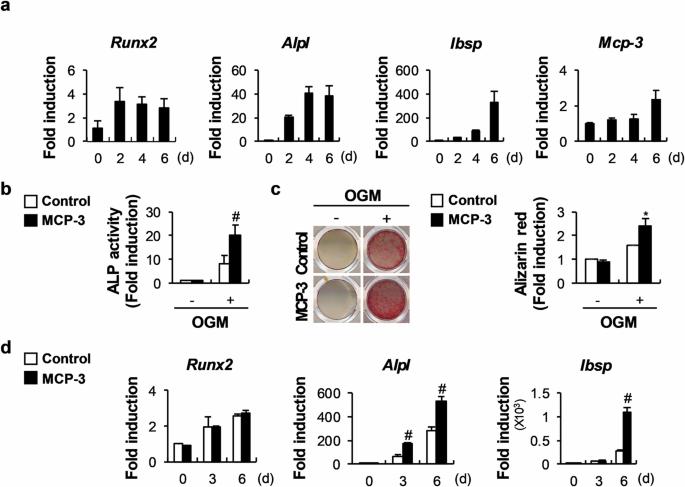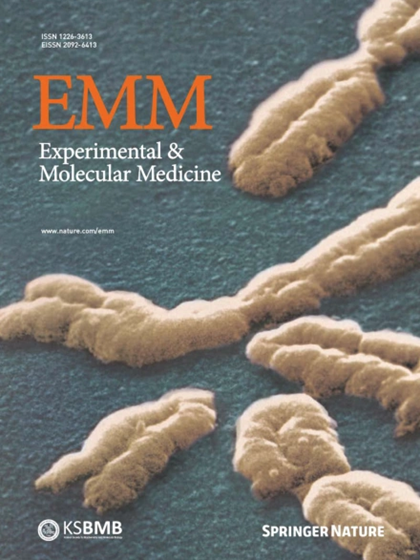MCP-3/Ccr3 轴通过影响成骨细胞和破骨细胞的分化来增加骨量。
IF 9.5
2区 医学
Q1 BIOCHEMISTRY & MOLECULAR BIOLOGY
引用次数: 0
摘要
据报道,多种 CC 亚家族趋化因子可通过影响成骨细胞或破骨细胞的分化来调节骨代谢。然而,单核细胞趋化蛋白 3(MCP-3)是一种 CC 趋化因子,它在骨重塑中的作用尚不十分清楚。在这里,我们发现 MCP-3 通过促进成骨细胞分化和抑制破骨细胞分化来调节骨重塑。在 Ccr3 依赖性作用下,MCP-3 通过刺激 p38 磷酸化促进成骨细胞分化,并通过上调干扰素 beta 抑制破骨细胞分化。MCP-3 增加了骨形态发生蛋白 2 诱导的异位骨形成,过表达 MCP-3 的成骨细胞前体细胞的小鼠骨量增加。此外,MCP-3 还具有抑制核因子卡巴-B 受体激活剂配体诱导的骨质流失的治疗效果。因此,由于 MCP-3 在成骨细胞分化中的积极作用和在破骨细胞分化中的消极作用,它对涉及骨质流失的疾病具有治疗潜力。本文章由计算机程序翻译,如有差异,请以英文原文为准。

The MCP-3/Ccr3 axis contributes to increased bone mass by affecting osteoblast and osteoclast differentiation
Several CC subfamily chemokines have been reported to regulate bone metabolism by affecting osteoblast or osteoclast differentiation. However, the role of monocyte chemotactic protein 3 (MCP-3), a CC chemokine, in bone remodeling is not well understood. Here, we show that MCP-3 regulates bone remodeling by promoting osteoblast differentiation and inhibiting osteoclast differentiation. In a Ccr3-dependent manner, MCP-3 promoted osteoblast differentiation by stimulating p38 phosphorylation and suppressed osteoclast differentiation by upregulating interferon beta. MCP-3 increased bone morphogenetic protein 2-induced ectopic bone formation, and mice with MCP-3-overexpressing osteoblast precursor cells presented increased bone mass. Moreover, MCP-3 exhibited therapeutic effects by abrogating receptor activator of nuclear factor kappa-B ligand-induced bone loss. Therefore, MCP-3 has therapeutic potential for diseases involving bone loss due to its positive role in osteoblast differentiation and negative role in osteoclast differentiation. Our bones are always changing, needing a balance between bone creation and bone breakdown. Researchers investigates how a specific protein, MCP-3, affects this balance. They found that MCP-3 promotes the creation of osteoblasts and stops the creation of osteoclasts. The study involved both in vitro and in vivo methods, looking at how changing MCP-3 levels impacts bone change processes. Researchers found that increasing MCP-3 levels in bone-making cells resulted in stronger bones in mice, suggesting MCP-3 is key in promoting bone creation and stopping excessive bone loss. This was partly due to MCP-3’s interaction with specific cell receptors and signaling pathways that affect bone cell activity. This research paves the way for future studies on MCP-3 as a target for bone-strengthening therapies, potentially leading to new treatments for diseases that weaken bones. This summary was initially drafted using artificial intelligence, then revised and fact-checked by the author.
求助全文
通过发布文献求助,成功后即可免费获取论文全文。
去求助
来源期刊

Experimental and Molecular Medicine
医学-生化与分子生物学
CiteScore
19.50
自引率
0.80%
发文量
166
审稿时长
3 months
期刊介绍:
Experimental & Molecular Medicine (EMM) stands as Korea's pioneering biochemistry journal, established in 1964 and rejuvenated in 1996 as an Open Access, fully peer-reviewed international journal. Dedicated to advancing translational research and showcasing recent breakthroughs in the biomedical realm, EMM invites submissions encompassing genetic, molecular, and cellular studies of human physiology and diseases. Emphasizing the correlation between experimental and translational research and enhanced clinical benefits, the journal actively encourages contributions employing specific molecular tools. Welcoming studies that bridge basic discoveries with clinical relevance, alongside articles demonstrating clear in vivo significance and novelty, Experimental & Molecular Medicine proudly serves as an open-access, online-only repository of cutting-edge medical research.
 求助内容:
求助内容: 应助结果提醒方式:
应助结果提醒方式:


